Physical Address
304 North Cardinal St.
Dorchester Center, MA 02124
Physical Address
304 North Cardinal St.
Dorchester Center, MA 02124

In today’s fast-paced digital landscape, it is crucial for businesses to offer a smooth and consistent customer experience across multiple platforms. The goal of omnichannel marketing is to ensure that customers have a cohesive and consistent experience, no matter which platform they choose to use.
Martech (Marketing Technology) tools play a crucial role in shaping the Digital Customer Experience (DCX) by enabling businesses to integrate, analyze and optimize their marketing efforts. This blog explores the importance of omnichannel experiences, the role of Martech tools, and how DCX is shaping up.
In the digital age, customers expect a seamless experience across all touch points. Whether they interact with a brand via social media, email, or in-store, they expect consistency in messaging, service, and overall experience. An effective omnichannel strategy ensures that customers can smoothly transition between different channels without any interruption.
Omnichannel marketing is about developing a cohesive and integrated customer journey. For example, a customer might start their journey on a brand’s website, receive personalized emails, and then visit a physical store. An omnichannel approach ensures that each of these interactions is connected, providing a seamless experience.
Martech tools allow companies to collect and analyze data from various sources, offering insights into customer behavior and preferences. This data-driven approach helps create personalized experiences, which are vital for building customer loyalty and conversions.
Martech tools are vital to executing and overseeing a successful omnichannel approach. These tools cover a wide range of technologies, such as customer relationship management (CRM) systems, marketing automation platforms, and analytics tools. They help companies make their marketing activities more effective, enhancing customer engagement, and evaluating the success of their campaigns.
CRMs are the backbone of any omnichannel strategy. They store customer data, track interactions and provide valuable insights into customer preferences. By integrating CRM systems with other Martech tools, businesses can deliver personalized experiences across all channels.
These platforms automate repetitive tasks such as email marketing, social media posting and advertising campaigns. Automation ensures that customers receive appropriate and timely messages, improving their overall journey.
Data is at the heart of omnichannel marketing. Analytics tools help businesses track customer behavior, measure campaign performance, and identify areas for improvement. By examining information from a variety of sources, businesses can make educated choices and update their marketing plans.
A CMS allows companies to manage and distribute content across different platforms. By using a CMS, businesses can ensure that their messaging is consistent and tailored to each platform, enhancing the customer experience.
CDPs gather and consolidate customer information from numerous sources, offering a comprehensive view of the customer. This unified data allows companies to create highly personalized experiences, driving engagement and loyalty.
Marketing Technology News: MarTech Interview with Jon Moran, Head of MarTech Marketing Solutions @ SAS
Martech tools are instrumental in shaping DCX by providing businesses with the capabilities to understand, engage and delight their customers. Here’s how:
Customers expect personalized experiences, and Martech tools make this possible. By leveraging data from CRM systems, CDPs and analytics tools, companies can tailor their messaging and offers to individual customers. Personalization not only improves the customer experience, but also drives higher conversion and conversion rates.
Effective DCX requires seamless integration of all customer touchpoints. Martech tools facilitate this integration by connecting different systems and platforms. This ensures that customers have a consistent experience, whether they engage with the brand digitally or physically.
Martech tools enable real-time engagement with customers. For example, marketing automation platforms can trigger personalized emails based on customer actions, while analytics tools can provide real-time insights into customer behavior. This real-time engagement is crucial to meeting customer expectations and staying ahead of the competition.
Martech tools provide businesses with valuable data and insights. By analyzing this data, companies can make informed decisions and optimize their marketing strategies. This data-driven approach helps identify customer pain points, improve the overall experience, and drive business growth.
Martech tools also play a role in collecting and analyzing customer feedback. Using surveys, social listening tools and support platforms, companies can gather insights into customer satisfaction and areas for improvement. This feedback is essential to continuously improve the DCX.
Achieving a true omnichannel experience is vital for companies looking to thrive in the digital age. Martech tools provide the capabilities needed to integrate, analyze and optimize marketing efforts, ensuring a seamless and personalized customer experience. By leveraging Martech tools, businesses can shape a superior Digital Customer Experience, drive customer loyalty and business growth. Allocating resources to the appropriate Martech tools and tactics is key to being competitive and meeting the changing demands of modern customers.
Marketing Technology News: Omnichannel Marketing and Social Commerce – Unlocking New Revenue Streams